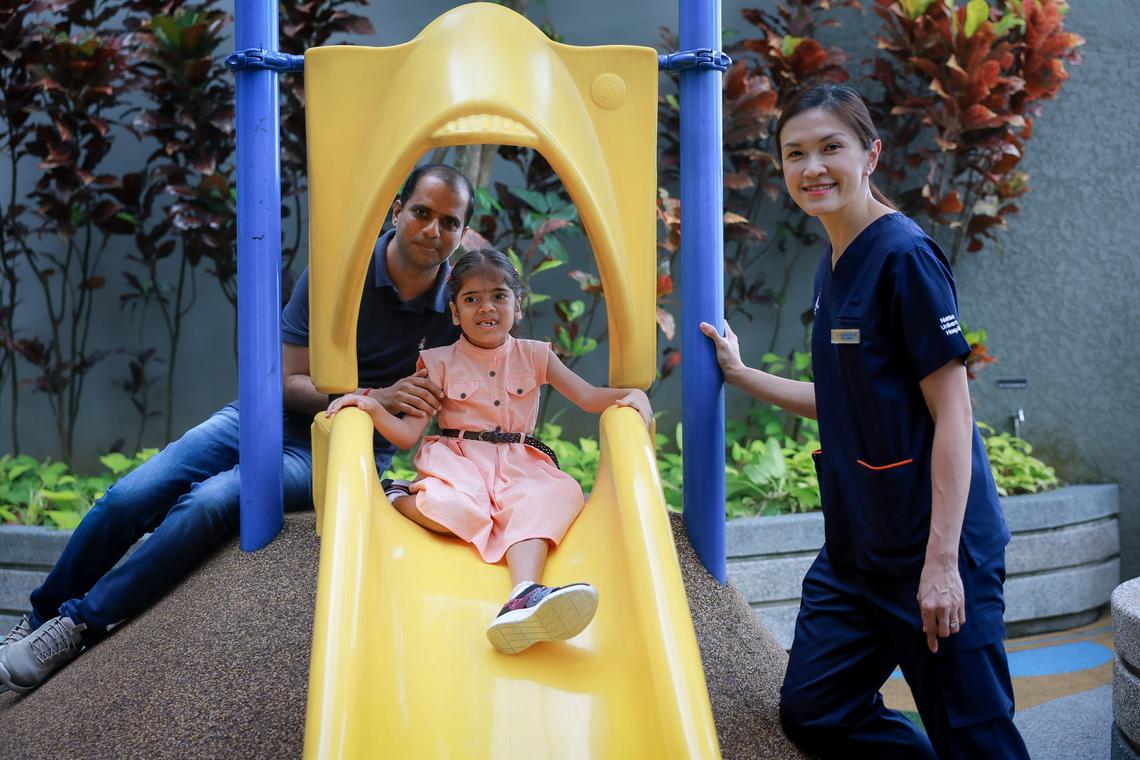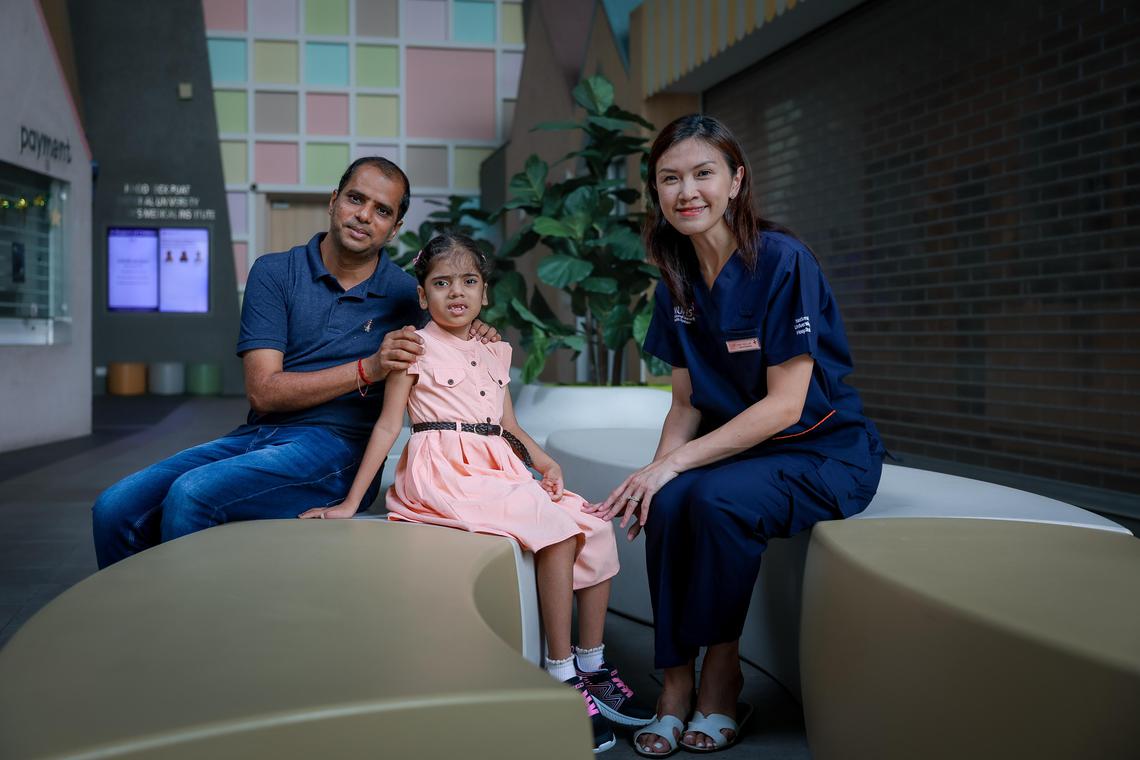SINGAPORE – When Geethika Rao was six months old, her parents noticed she had not hit certain developmental milestones such as rolling over or sitting up.
Her father, Mr Veerama Rao, noted that their son, who is three years older than Geethika, had not encountered such delays as an infant.
“That is when we had some suspicion that something is not right,” said the 44-year-old IT professional.
On the advice of relatives, the family, who were still living in India at the time, brought Geethika to neurologists and other specialists for a diagnosis.
Despite running a number of genetic tests, doctors were unable to determine what exactly her condition was.
After the family moved to Singapore in 2018, when Geethika was eight months old, her parents continued their search for a diagnosis.
Other symptoms emerged – Geethika experienced sleep disturbances, often waking up at night, and showed a reduced sensitivity to pain.
Mr Rao recalled that once Geethika, who is now seven, showed little reaction when she lost a tooth after running into a wooden frame of a sofa at home.
“She only cried for about 10 to 15 minutes, and then she fell asleep,” he said.
It was only in 2022, after a visit to the National University Hospital (NUH), that they discovered that Geethika has a developmental disorder known as Smith-Magenis syndrome (SMS).

Despite running a number of genetic tests, doctors were unable to determine what exactly Geethika’s condition was when she was six months old.ST PHOTO: GAVIN FOO
Also known as 17p-microdeletion syndrome, SMS is a genetic disorder that typically results from a chromosomal deletion – a type of genetic abnormality where a segment of a chromosome is missing or lost.
It affects about one in 25,000 people worldwide.
Dr Chin Hui-Lin, from the Khoo Teck Puat – National University Children’s Medical Institute at NUH, said early signs of the syndrome in infants includes softer muscle tone and having difficulty sucking or swallowing.
“As the child grows a bit older, you may then start seeing some degree of development delay and or what we consider intellectual disability,” said Dr Chin, who is a senior consultant from the genetics and metabolism division at the institute’s paediatrics department.
They may also display unusual movements that are unique to them, she added. These include self-hugging as well as more injurious behaviours such as head banging and skin picking.
Children with the syndrome may also have unique facial characteristics, different from those of their parents, she said.
Some of these features – which genetic specialists are trained to look out for – include broader, more angular foreheads and deeper-set eyes, Dr Chin said.
Sleep disturbances, a risk of seizures and behavioural issues such as hyperactivity and short attention spans are other possible tell-tale signs, she added.
Children with the syndrome also have an increased risk of developing other health issues, including scoliosis, thyroid problems and sleep apnea, Dr Chin added.
Doctors might not have been able to previously pinpoint Geethika’s disorder as they may have been testing for other conditions, she noted.
While she had been through a number of genetic tests – including exome sequencing, which can capture some 85 per cent of known disease-causing genetic variants – all such tests have limitations, Dr Chin said.
“No one test can see every single thing,” she said.
The nature of the chromosomal deletion in Geethika’s case was between the coding and non-coding regions in one part of the gene, said Dr Chin, adding that the exome sequencing that was conducted previously did not look at non-coding regions.
Coding regions contain instructions for building proteins while non-coding regions do not. Mutations in coding regions are known to cause genetic diseases.
A process known as whole genome sequencing – where an individual’s entire genome is sequenced, including both coding and non-coding regions – was able to more comprehensively cover Geethika’s genes, Dr Chin said, allowing doctors to diagnose her with SMS.
There is no drug that can cure SMS, she said, with treatment dependent on how the condition manifests itself.
For example, developmental delays would require early intervention, while behavioural issues may require consulting occupational therapists, she suggested.
The diagnosis has allowed Geethika’s family to gain a clearer understanding of her condition, Mr Rao said, while noting that Geethika is still not fully verbal and faces challenges with executive functioning.
The Raos have since joined the Rare Disorders Society (Singapore), an organisation supporting patients and families with rare conditions.
Mr Rao also recently stepped forward to be the volunteer regional representative for the Parents and Researchers Interested In Smith-Magenis Syndrome (Prisms) group, a US-based organisation that supports families and individuals with the condition.
Dr Chin urged parents facing similar circumstances as the Rao family to seek prompt diagnosis for their children, emphasising that genetic testing – including whole genome sequencing – is far more accessible now.
A Smith-Magenis syndrome diagnosis should not lead to distress for parents but instead motivate them to explore the most effective ways to manage the condition, she added.
It was not easy at first to accept his daughter’s diagnosis, Mr Rao said.
“We took some time to digest the fact, but then we adopted a mindset of looking forward, of thinking what else we can do to support her?”
- Zhaki Abdullah is a correspondent at The Straits Times. He is on the health beat, in addition to occasionally covering science, environmental, tech and Muslim affairs issues.
Join ST’s WhatsApp Channel and get the latest news and must-reads.
